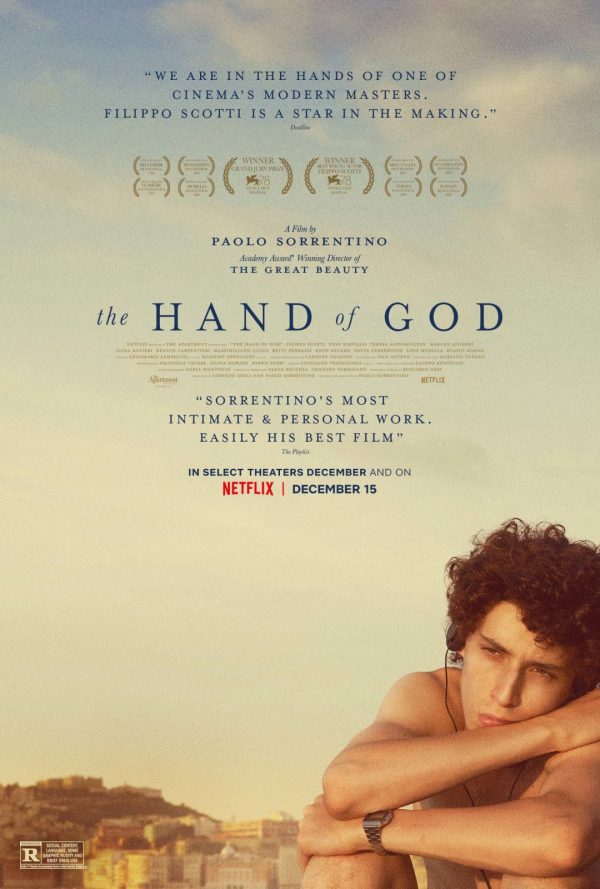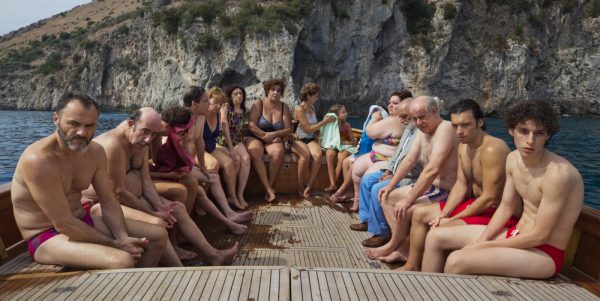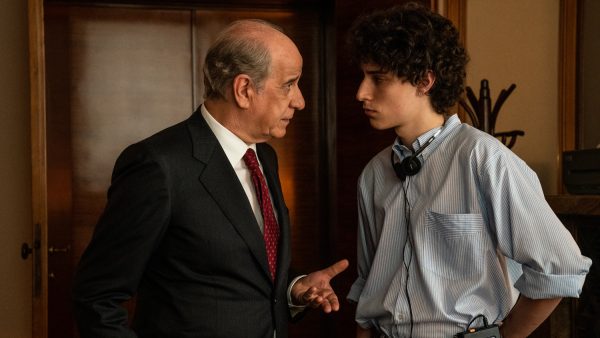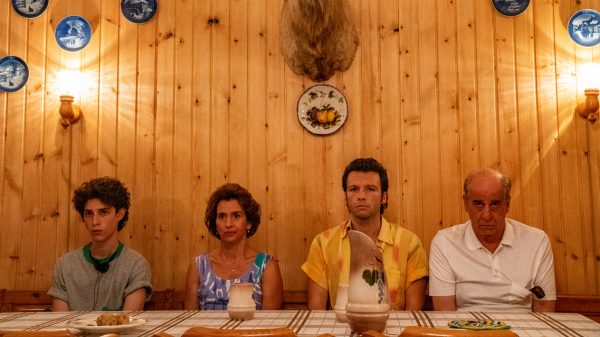The Hand of God, 2021.
Directed by Paolo Sorrentino.
Starring Filippo Scotti, Luisa Ranieri, Toni Servillo, Teresa Saponangelo, Massimiliano Gallo, Renato Carpentieri, Marlon Joubert and Betti Pedrazzi.
SYNOPSIS:
An aspiring filmmaker in Naples must navigate sex, coming of age and tragedy against the backdrop of Diego Maradona’s much-heralded arrival in the city.
Football has immense power to unite communities, as well as divide them. While this year’s Euro 2020 final may be remembered for the horrific scenes of flare-meets-arse-based carnage in Leicester Square and utter yobbery on Wembley Way, it’s also worth recalling how exciting those few weeks felt as an England fan. Footballing success galvanises community spirit and provides disparate social groups and people with a shared devotion.
This is made clear during a key scene in Paolo Sorrentino’s The Hand of God, when Diego Maradona punches in the infamous, titular goal at the 1986 World Cup. The film’s characters are watching the match on their Neapolitan balconies and leap around in celebration, as if Maradona were sending Italy into the semi-finals rather than Argentina. “It’s a political act, a revolution,” exclaims one character while others just marvel at the sheer audacity of what Naples’ adopted son has pulled off on the sport’s biggest stage. Everyone has a different take on what it all means, but their awestruck reactions are as one.
Indeed, football’s unique unifying force sits as a constant sizzle beneath Sorrentino’s deeply personal film, which is partially inspired by his own life – including a very painful tragedy mirrored on screen in brutally real fashion. The analogue for Sorrentino is the Chalamet-a-like Fabietto (Filippo Scotti), who is obsessed with two things – the prospect of Maradona signing for Napoli and his aunt Patrizia’s (Luisa Ranieri) penchant for public nudity. His parents (Toni Servillo and Teresa Saponangelo), meanwhile, are in the midst of heated rows over Servillo’s character’s long-standing affair.
The Hand of God is a difficult movie to love, unravelling as a shapeless and ill-disciplined meander through the protagonist’s life. By never settling on a clear central thread, the film makes it difficult to connect with on an emotional level – especially as Fabietto is never much more than a tactiturn blank canvas. We know he idolises Maradona, but we don’t know what impact that has on him or why he suddenly decides that he wants to pursue a career as a filmmaker. Certainly, beyond the recurring image of a rented Once Upon a Time in America videotape, cinema doesn’t seem to play a big part in his life.
In fact, the best moments of The Hand of God are the small family details – the way Saponangelo’s lively, devilish character plays elaborate pranks on her relatives or prompts the cantankerous, elderly Signora Gentile (Dora Romano) into a sweary outburst. Sorrentino clearly knows these people and these scenes, however heightened, ring true – even when the characters have an over-cranked, pantomime quality. Unfortunately, these enjoyable vignettes aren’t enough to sustain the movie through its ambling two-hour running time, leaving it looking desperate for a direction of some sort. Some story threads get tossed aside seemingly at random, while others become bizarrely prominent and others still – a very uncomfortable sex scene, for example – lack any material impact on the film around them.
Sorrentino assembles a talented ensemble cast for the movie, but struggles to pull all of these disparate pieces together into something coherent. Fittingly, perhaps, it has the quality of a half-remembered childhood reminiscence. But, like someone rambling about their childhood, it has a shelf life and a threshold after which it becomes a little dull. The Hand of God is a movie of powerful, well-observed moments, but unfortunately they’re moments spread very thinly over an otherwise unengaging dive into 1980s Naples. It certainly could’ve done with some of the magic and charisma of Maradona.
Flickering Myth Rating – Film: ★ ★ ★ / Movie: ★ ★
Tom Beasley is a freelance film journalist and wrestling fan. Follow him on Twitter via @TomJBeasley for movie opinions, wrestling stuff and puns.













